The agency branded these premium babies
that would go to premium parents.But behind the scenes…none of those things
[the agency said] were true.In fact, the agency routinely kept babies for at least six months in order to conduct a series of really horrific experiments on them, in order to produce the same matching I described earlier.
— Gabrielle Glaser,
journalist and bestselling author
of American Baby —
↑ Listen right here! ↑
Think of the Closed Adoption Era as the “Good Old Days”? Think Again.
“Closed” means a lot of things when applied to adoption. At its heart, it means that things were done in secret, realities were not faced, records were closed to forever separate original and forever families, and hearts and minds had to cauterize (close) around an unacknowledged wound.
My guest in this month’s podcast, Gabrielle Glaser, has written brilliantly about all of this in her new bestselling book American Baby.
With this Season 2 opener of Adoption: The Long View, Gabrielle and I talk about the various effects of closedness. During the Closed Adoption Era, adoption professionals were able to operate behind closed doors, in secrecy, wielding unchecked power in the dark.
Bad things can happen to vulnerable people when powerful people have that much cover.
Who Is Vulnerable in Adoption?
Certainly the “unwed mother,” cast out from her family and social circles.
Also the adopting parents, who so desperately want to build a family, often after being thwarted by infertility.
In both cases, desperation makes a person easy prey for a predator.
But perhaps the person most vulnerable in adoption is the newborn baby at the center.
~~~~~
I call the Closed Adoption Era, which informs what the general population “knows” about adoption, a failed experiment. It makes sense that something rooted in shame and secrecy would not turn out well for those involved. We need movement toward practices and policies with truth and transparency as the guide.
This is why I was so excited to talk with journalist and author Gabrielle Glaser, who has investigated the devastating results of such closedness.
What Happens When Adoptions Take Place Behind Closed Doors?
The powerful become more powerful.
That’s the short answer, but there’s so much more. Like Georgia Tann before her, Louise Wise and the agency that bears her name were able to do unconscionable things in secret, with no accountability. Despite the wrongness of it all, Louise Wise records remain sealed at Yale University — for 44 more years! The closedness ensures that justice will never be served for those who suffered.
The Louise Wise agency partnered with researchers who needed newborns who didn’t quite have parents — in this case were between parents — to conduct experiments on. That’s right. You’ll hear Gabrielle talk about what she found out about intentional physical pain inflicted on 10 minute-old babies.
But only those bound for adoption.
Prefer to read Episode 201? Here’s a transcript (but listening is so much better).
In episode 201, Gabrielle and I explore the impacts of secrecy on adopting parents, on placing parents, and most of all, on the person adoption is supposed to center on, the adoptee. Besides closed doors and closed records, we also cover the effect of closed hearts and minds on people living in adoption. And more:
- How a story on living kidney donation turned into a friendship, and eventually into the book American Baby.
- The real-life, widespread, and devastating costs of not having full health history.
- The lengths unethical agencies and individuals will go to when granted the cover of darkness and secrecy.
- The impact on adoptees of the common sentiment “she loved you so much she gave you up.”
- Bowling as birth control. (Seriously!)
- Shocking experiments done on newborns toward the goal of matching them well with new parents.
Gabrielle Glaser, Journalist, Author, Now Advocate for Openness in Adoption
Author of American Baby: A Mother, A Child, and the Shadow History of Adoption, Gabrielle Glaser tells the shocking truth about postwar adoption in America through the bittersweet story of one teenager, the son she was forced to relinquish, and their lifelong search to find each other, thwarts and all.
Gabrielle has become a force in the movement to open up adoption in all ways and take away shame and secrecy that allows bad actors to benefit themselves with impunity. She shares the impact of secrets on the adopted person, as well as the innate need many people have to know and connect with their origins. You don’t want to miss this episode.
Show Notes from Ep 201 with Gabrielle Glaser
- Website: GabrielleGlaser.com
- American Baby on Amazon
- Gabrielle Glaser’s other books on Amazon
- Lori’s previous post on the Louise Wise agency, about Three Identical Strangers
How to Tune In Regularly
You can find us on Adopting.com, and on these and other platforms.
- Spotify
- Apple Podcasts
- Amazon Podcasts
- Castbox
- Search for “Adoption Long View” on your preferred podcast platform.
A new episode comes out the first Friday of the month. Thank you for sharing, subscribing, and rating this episode!
Did you know that Adoption: The Long View is now listed among the Top 25 adoption podcasts?
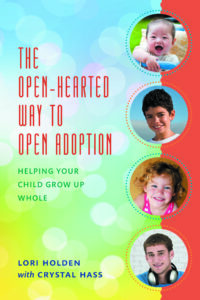
Lori Holden, mom of a young adult daughter and a young adult son, writes from Denver. She was honored as an Angel in Adoption® by the Congressional Coalition on Adoption Institute.
Her first book, The Open-Hearted Way to Open Adoption: Helping Your Child Grow Up Whole, makes a thoughtful anytime gift for the adoptive families in your life. Her second book, Standing Room Only: How to Be THAT Yoga Teacher is now available in paperback, and her third book, Adoption Unfiltered, is now available through your favorite bookseller!
Find Lori’s books on her Amazon Author page and catch episodes of Adoption: The Long View wherever you get your podcasts.

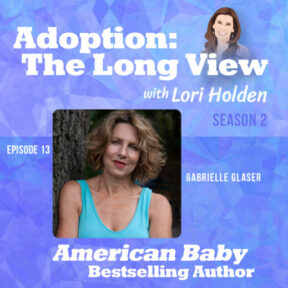
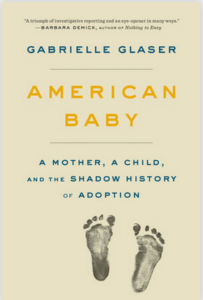
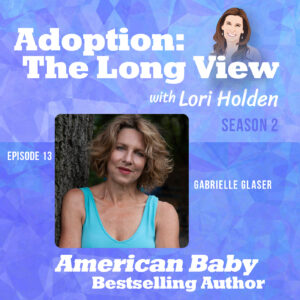
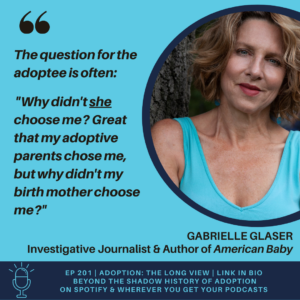
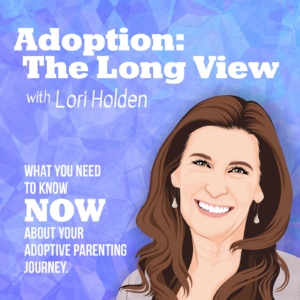
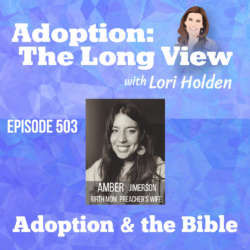
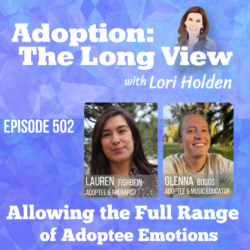
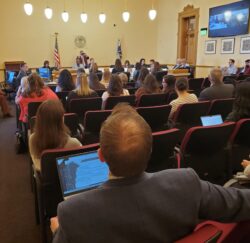
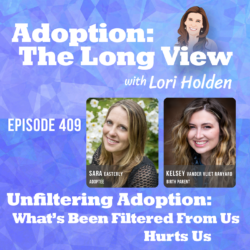

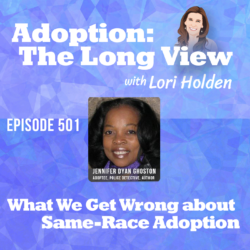

6 Responses
What an excellent guest for the first episode of the season. Great interview and such an important book. And I can’t even tell you how important her answer to your last question was to me personally.
Thank you.
I really loved what she said, too, Candace. Thank you so much for your kind words.
Ooh, I can’t wait to listen to this episode!! That was an amazing book! 🙂
CBS Sunday Morning did a story on the book about two Sundays ago. Gabrielle was interviewed, as well as Margaret (birth mother), David’s wife and children.
I’m so glad you brought that up, Loribeth! Here is the link to CBS Sunday Morning for those who want to see more. https://www.cbsnews.com/video/an-adoption-tale-uncovering-a-lifelong-secret/
You don’t say the word “father” at any point. That is a deep oversight.
There is mention of the original mother and father around minute 32. Thanks for listening, and you’re right, there should be more attention paid to fathers.